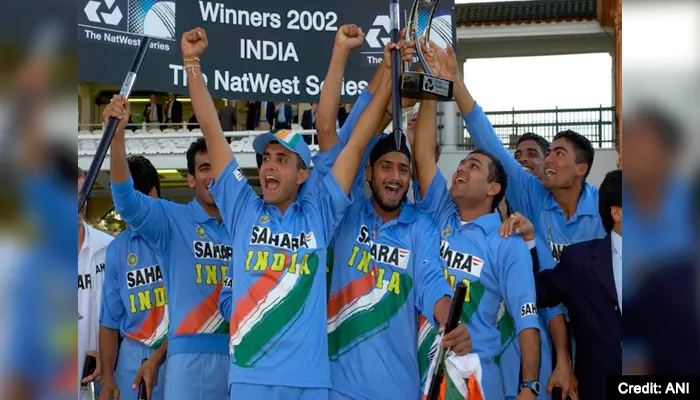
When two fearless youngsters at Lord's turned the weight of history into a weapon
In the long tapestry of India's sporting journey since 1947, some victories are more than merely wins - they are statements. July 13, 2002, stands among them. On a sunlit afternoon at Lord's, the NatWest Series final began as just another chapter in England's cricketing summer but turned into a modern-day Lagaan - not in a dusty village field but at the heart of the sport's colonial cradle.
England, the home team, posted a formidable 325. In that pre-T20 era, such a total looked like a mountain, especially for an Indian side still grappling with the tag of “finals chokers.” For years, we had come close, only to stumble. That afternoon seemed poised to follow the familiar script.

Credit: ESPN
Sourav Ganguly and Virender Sehwag, India's openers, strode out without a hint of hesitation. Ganguly's offside artistry complemented Sehwag's fearless striking, and in just 14 overs, they amassed 106 runs. For a while, the improbable looked possible.
But sport loves drama. In a sudden collapse, India tumbled from 106 without loss to 146 for five. Ganguly (60) was gone, Sehwag (45) departed, Dravid (5) and Mongia (9) followed, and even Sachin Tendulkar (14) - the man the nation looked to in such moments - walked back in silence. Lord's roared; England sensed victory.

Credit: Cricket Addictor
At number seven was Mohammad Kaif - an unusual spot for a player more accustomed to the top order. At the other end, Yuvraj Singh, all flair and aggression. Together, they not only scored runs but also built belief. Kaif pressed the gaps, turning singles into twos. Yuvraj struck nine boundaries and a towering six, undermining England's confidence.
As their partnership passed the 100-run mark, the game shifted in favour. For the first time that day, Indian supporters at Lord's regained their voice.

![]()
When Yuvraj fell for 69, the task remained fraught. Harbhajan Singh (15) showed resilience, Kumble fell controversially, and suddenly Kaif was left with Zaheer Khan. The clock was running out.
Determined to finish before the final ball, Kaif faced Andrew Flintoff in the 50th over with calm precision. A quick pair of runs sealed it. India had chased down 325 and won by just 2 wickets with 3 balls remaining — a record-breaking achievement for that era.

Credit: The News Mill
Then arrived the iconic image that marked the day: Sourav Ganguly, our very own Dada, shirtless on the Lord's balcony, waving his jersey in bold, unfiltered defiance. For years, India's teams had been seen as skilled but lacking passion. That moment, combined with the victory, shattered that stereotype.

Credit: Cricket Monthly
Kaif's unbeaten 87 became the pinnacle of his career. Yuvraj's 69 solidified his reputation as a match-winner. For Indian cricket, the NatWest Trophy final redefined the rules: victory was achievable without Sachin at the crease; strength could rival skill.
For a nation that had regained political independence 55 years earlier, it was a symbolic act of sporting independence - defeating the former rulers in their own territory, in their own game.
In the 79-year saga of Indian sports, this was more than just a cricket match. It served as a reminder that even in the most formidable battles, belief can alter destiny. That day, India didn't merely win a trophy - they returned the Lagaan to the British, with interest.